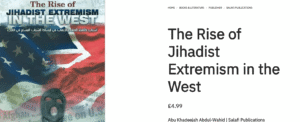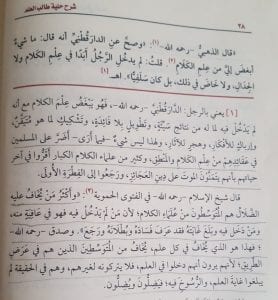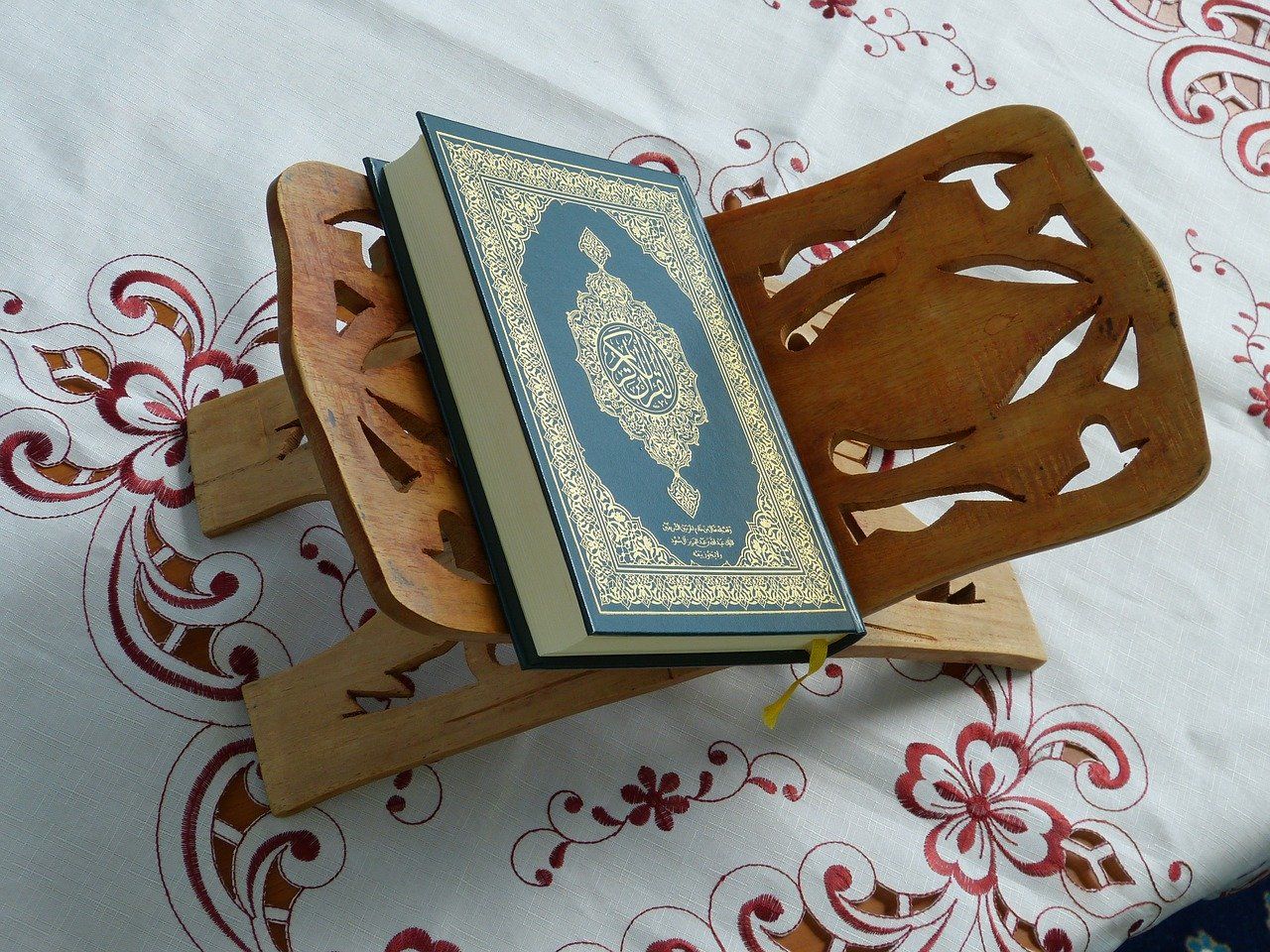In The Name of Allaah, The Most Merciful, The Bestower of Mercy.
Firstly: We repeat once again the fact that rebutting false beliefs, ideas and views does not necessitate bad behaviour, rather Muslims are commanded to behave well towards others. Must read: https://www.abukhadeejah.com/living-with-non-muslims-in-the-west-with-fine-conduct/ https://salafidawahmanchester.com/2017/05/stance-proactive-order-protect-muslims-non-muslim-neighbours-inhuman-ideologies-devilish-acts-jihaadist-terrorists-sympathisers/
Allaah [The Most High] said:
قُلۡ يَـٰٓأَهۡلَ ٱلۡكِتَـٰبِ تَعَالَوۡاْ إِلَىٰ ڪَلِمَةٍ۬ سَوَآءِۭ بَيۡنَنَا وَبَيۡنَكُمۡ أَلَّا نَعۡبُدَ إِلَّا ٱللَّهَ وَلَا نُشۡرِكَ بِهِۦ شَيۡـًٔ۬ا وَلَا يَتَّخِذَ بَعۡضُنَا بَعۡضًا أَرۡبَابً۬ا مِّن دُونِ ٱللَّهِۚ فَإِن تَوَلَّوۡاْ فَقُولُواْ ٱشۡهَدُواْ بِأَنَّا مُسۡلِمُونَ
Say (O Muhammad): “O people of the Scripture (Jews and Christians): Come to a word that is just between us and you, that we worship none but Allah, and that we associate no partners with Him, and that none of us shall take others as lords besides Allah. Then, if they turn away, say: “Bear witness that we are Muslims.” [Surah Aal Imraan. Aayah 64]
Meaning: say to the people of the scripture – the Jews and Christians, [تَعَالَوۡاْ إِلَىٰ ڪَلِمَةٍ۬ سَوَآءِۭ بَيۡنَنَا وَبَيۡنَكُمۡ – Come to a word that is just between us and you]- Meaning: Come let us unite upon the statement which all the Prophets and Messengers agreed upon and none opposed it except the obstinate and misguided. This statement is not specific to anyone of us, rather it is something that you and us should establish between us, so this is justice and fairness in debate. Then Allaah explains this and said: [أَلَّا نَعۡبُدَ إِلَّا ٱللَّهَ وَلَا نُشۡرِكَ بِهِۦ شَيۡـًٔ۬ا – that we worship none but Allah, and that we associate no partners with Him]- Meaning: We should single out Allaah in worship, devoting all love, fear and hope to Him alone, and we should not associate anyone as partner with Allaah in worship- neither a Prophet, an Angel, a Righteous Person, an Idol, a Deified image, a living or non-living thing, [وَلَا يَتَّخِذَ بَعۡضُنَا بَعۡضًا أَرۡبَابً۬ا مِّن دُونِ ٱللَّهِۚ – and that none of us shall take others as lords besides Allaah]; rather all obedience is to be devoted to Allah and His Messengers. [فَإِن تَوَلَّوۡاْ فَقُولُواْ ٱشۡهَدُواْ بِأَنَّا مُسۡلِمُونَ – Then, if they turn away, say: “Bear witness that we are Muslims]. [Tafsir As-Sadi]
Shaikhul Islaam Ibn Taymiyyah [rahimahullaah] said: Allaah [The Most High] said:
شَرَعَ لَكُم مِّنَ ٱلدِّينِ مَا وَصَّىٰ بِهِۦ نُوحً۬ا وَٱلَّذِىٓ أَوۡحَيۡنَآ إِلَيۡكَ وَمَا وَصَّيۡنَا بِهِۦۤ إِبۡرَٲهِيمَ وَمُوسَىٰ وَعِيسَىٰٓۖ أَنۡ أَقِيمُواْ ٱلدِّينَ وَلَا تَتَفَرَّقُواْ فِيهِۚ كَبُرَ عَلَى ٱلۡمُشۡرِكِينَ مَا تَدۡعُوهُمۡ إِلَيۡهِۚ ٱللَّهُ يَجۡتَبِىٓ إِلَيۡهِ مَن يَشَآءُ وَيَہۡدِىٓ إِلَيۡهِ مَن يُنِيبُ
وَمَا تَفَرَّقُوٓاْ إِلَّا مِنۢ بَعۡدِ مَا جَآءَهُمُ ٱلۡعِلۡمُ بَغۡيَۢا بَيۡنَہُمۡۚ وَلَوۡلَا كَلِمَةٌ۬ سَبَقَتۡ مِن رَّبِّكَ إِلَىٰٓ أَجَلٍ۬ مُّسَمًّ۬ى لَّقُضِىَ بَيۡنَہُمۡۚ وَإِنَّ ٱلَّذِينَ أُورِثُواْ ٱلۡكِتَـٰبَ مِنۢ بَعۡدِهِمۡ لَفِى شَكٍّ۬ مِّنۡهُ مُرِيبٍ۬
فَلِذَٲلِكَ فَٱدۡعُۖ وَٱسۡتَقِمۡ ڪَمَآ أُمِرۡتَۖ وَلَا تَتَّبِعۡ أَهۡوَآءَهُمۡۖ وَقُلۡ ءَامَنتُ بِمَآ أَنزَلَ ٱللَّهُ مِن ڪِتَـٰبٍ۬ۖ وَأُمِرۡتُ لِأَعۡدِلَ بَيۡنَكُمُۖ ٱللَّهُ رَبُّنَا وَرَبُّكُمۡۖ لَنَآ أَعۡمَـٰلُنَا وَلَكُمۡ أَعۡمَـٰلُڪُمۡۖ لَا حُجَّةَ بَيۡنَنَا وَبَيۡنَكُمُۖ ٱللَّهُ يَجۡمَعُ بَيۡنَنَاۖ وَإِلَيۡهِ ٱلۡمَصِيرُ
He (Allaah) has ordained for you the same religion (Islaam) which He ordained for Nooh (Noah), and that which We have inspired in you (O Muhammad), and that which We ordained for Ibraheem (Abraham), Moosaa (Moses) and ‘Iesa (Jesus) saying you should establish religion (i.e. to do what it orders you to do practically), and make no divisions in it (religion) (i.e. various sects in religion). Intolerable for the Mushrikoon, is that to which you (O Muhammad) call them. Allaah chooses for Himself whom He wills, and guides unto Himself who turns to Him in repentance and in obedience. And they divided not till after knowledge had come to them, through selfish transgression between themselves. And had it not been for a Word that went forth before from your Lord for an appointed term, the matter would have been settled between them. And verily, those who were made to inherit the Scripture [i.e. the Tauraat (Torah) and the Injeel (Gospel)] after them (i.e. Jews and Christians) are in grave doubt concerning it (i.e. Allaah’s true religion, Islaam or the Qur’aan). So unto this (religion of Islaam, alone and this Qur’aan) then invite (people) (O Muhammad), and Istaqim [(i.e. stand firm and straight on Islaamic Monotheism by performing all that is ordained by Allaah (good deeds, etc.), and by abstaining from all that is forbidden by Allaah (sins and evil deeds, etc.)], as you are commanded, and follow not their desires but say: “I believe in whatsoever Allaah has sent down of the Book [all the holy Books, this Qur’aan and the Books of the old from the Taurýt (Torah), or the Injeel (Gospel) or the Pages of Ibraahim (Abraham)] and I am commanded to do justice among you, Allaah is our Lord and your Lord.”42:13-15
Indeed, Allaah has ordained for us (Muslims) the same Religion which He ordained for Ibraaheem, Musa and Eesaa, and that we should establish this Religion and make no divisions in it; just as Allaah stated in another ayah:
فَأَقِمۡ وَجۡهَكَ لِلدِّينِ حَنِيفً۬اۚ فِطۡرَتَ ٱللَّهِ ٱلَّتِى فَطَرَ ٱلنَّاسَ عَلَيۡہَاۚ لَا تَبۡدِيلَ لِخَلۡقِ ٱللَّهِۚ ذَٲلِكَ ٱلدِّينُ ٱلۡقَيِّمُ وَلَـٰكِنَّ أَڪۡثَرَ ٱلنَّاسِ لَا يَعۡلَمُونَ
مُنِيبِينَ إِلَيۡهِ وَٱتَّقُوهُ وَأَقِيمُواْ ٱلصَّلَوٰةَ وَلَا تَكُونُواْ مِنَ ٱلۡمُشۡرِڪِينَ
مِنَ ٱلَّذِينَ فَرَّقُواْ دِينَهُمۡ وَڪَانُواْ شِيَعً۬اۖ كُلُّ حِزۡبِۭ بِمَا لَدَيۡہِمۡ فَرِحُونَ
”So set you (O Muhammad) your face towards the religion of pure Islaamic Monotheism Hanifa (worship none but Allaah Alone) Allaah’s Fitrah (i.e. Allaah’s Islaamic Monotheism), with which He has created mankind. No change let there be in Khalqillaah (i.e. the Religion of Allaah Islaamic Monotheism), that is the straight religion, but most of men know not. (Always) Turning in repentance to Him (only), and be afraid and dutiful to Him; and perform As-Salaat (Iqaama-As-Salaat) and be not of Al-Mushrikoon (the disbelievers in the Oneness of Allah, polytheists, idolaters, etc.). Of those who split up their religion (i.e. who left the true Islaamic Monotheism), and became sects, [i.e. they invented new things in the religion (Bid’ah), and followed their vain desires], each sect rejoicing in that which is with it.” [30:30-32]
And Allaah [The Exalted] said:
يَـٰٓأَيُّہَا ٱلرُّسُلُ كُلُواْ مِنَ ٱلطَّيِّبَـٰتِ وَٱعۡمَلُواْ صَـٰلِحًاۖ إِنِّى بِمَا تَعۡمَلُونَ عَلِيمٌ۬
وَإِنَّ هَـٰذِهِۦۤ أُمَّتُكُمۡ أُمَّةً۬ وَٲحِدَةً۬ وَأَنَا۟ رَبُّڪُمۡ فَٱتَّقُونِ
فَتَقَطَّعُوٓاْ أَمۡرَهُم بَيۡنَہُمۡ زُبُرً۬اۖ كُلُّ حِزۡبِۭ بِمَا لَدَيۡہِمۡ فَرِحُونَ
O (you) Messengers! Eat of the Tayyibaat [all kinds of Halaal (legal) foods which Allýh has made legal (meat of slaughtered eatable animals, milk products, fats, vegetables, fruits, etc.], and do righteous deeds. Verily! I am Well-Acquainted with what you do. And verily! This your religion (of Islaamic Monotheism) is one religion, and I am your Lord, so keep your duty to Me. But they (men) have broken their religion among them into sects, each group rejoicing in its belief”. [23:51-53]
So, Allaah informed us about the splitting of those who inherited the Scripture, such as the splitting of the Jews and the Christians. The Jews and the Christians split (into sects), such as the ‘Nastooriyyah’, the ‘Yaqoobiyyah’ and the ‘Malakiyyah’
Allaah [Glorified be He and free is He from all imperfections] said: [ وَإِنَّ ٱلَّذِينَ أُورِثُواْ ٱلۡكِتَـٰبَ مِنۢ بَعۡدِهِمۡ لَفِى شَكٍّ۬ مِّنۡهُ مُرِيبٍ۬ – And verily, those who were made to inherit the Scripture [i.e. the Tauraah (Torah) and the Injeel (Gospel)] after them; that is those ones who split (their Religion), are in GRAVE DOUBT concerning it (i.e. Allaah’s true religion Islam or the Qur’aan). [42:13]
This is the general inclination of the Jews and the Christians; they are in grave doubt concerning Allaah’s true Religion. Allaah [Glorified be He and free is He from all imperfections] said: [وَلَقَدۡ ءَاتَيۡنَا مُوسَى ٱلۡڪِتَـٰبَ فَٱخۡتُلِفَ فِيهِۚ وَلَوۡلَا كَلِمَةٌ۬ سَبَقَتۡ مِن رَّبِّكَ لَقُضِىَ بَيۡنَہُمۡۚ وَإِنَّہُمۡ لَفِى شَكٍّ۬ مِّنۡهُ مُرِيبٍ۬ – Indeed, We gave the Book to Moosaa (Moses), but differences arose therein, and had it not been for a Word that had gone forth before from your Lord, the case would have been judged between them, and indeed they are in grave doubt concerning it (this Qur’aan)]. [11:110]
And Allaah [The Exalted] said:
وَمَا قَتَلُوهُ وَمَا صَلَبُوهُ وَلَـٰكِن شُبِّهَ لَهُمۡۚ وَإِنَّ ٱلَّذِينَ ٱخۡتَلَفُواْ فِيهِ لَفِى شَكٍّ۬ مِّنۡهُۚ مَا لَهُم بِهِۦ مِنۡ عِلۡمٍ إِلَّا ٱتِّبَاعَ ٱلظَّنِّۚ وَمَا قَتَلُوهُ يَقِينَۢا بَل رَّفَعَهُ ٱللَّهُ إِلَيۡهِۚ وَكَانَ ٱللَّهُ عَزِيزًا حَكِيمً۬ا
But they killed him not, nor crucified him, but the resemblance of ‘Iesa (Jesus) was put over another man (and they killed that man), and those who differ therein are full of doubts. They have no (certain) knowledge, they follow nothing but conjecture. For surely; they killed him not [i.e. ‘Iesa (Jesus), son of Maryam (Mary) ]: But Allaah raised him [‘Iesa (Jesus)] up (with his body and soul) unto Himself (and he is in the heavens). And Allaah is Ever All Powerful, All Wise.” 4:157
Allaah [Glorified be He and free is He from all imperfections] said:
فَلِذَٲلِكَ فَٱدۡعُۖ وَٱسۡتَقِمۡ ڪَمَآ أُمِرۡتَۖ وَلَا تَتَّبِعۡ أَهۡوَآءَهُمۡۖ
”So unto this (religion of Islaam, alone and this Qur’aan) then invite (people) (O Muhammad), and Istaqim [(i.e. stand firm)], as you are commanded (42:15), upon the Religion that Allaah has ordained for us (Muslims). ”And Istaqim [(i.e. stand firm)], as you are commanded and follow not their desires” [42:15] ”And follow not their desires”: the Desires of the Jews and the Christians and that of the idol worshippers.
And Allaah [The Exalted] said:
وَلَٮِٕنۡ أَتَيۡتَ ٱلَّذِينَ أُوتُواْ ٱلۡكِتَـٰبَ بِكُلِّ ءَايَةٍ۬ مَّا تَبِعُواْ قِبۡلَتَكَۚ وَمَآ أَنتَ بِتَابِعٍ۬ قِبۡلَتَہُمۡۚ وَمَا بَعۡضُهُم بِتَابِعٍ۬ قِبۡلَةَ بَعۡضٍ۬ۚ وَلَٮِٕنِ ٱتَّبَعۡتَ أَهۡوَآءَهُم مِّنۢ بَعۡدِ مَا جَآءَكَ مِنَ ٱلۡعِلۡمِۙ إِنَّكَ إِذً۬ا لَّمِنَ ٱلظَّـٰلِمِينَ
And even if you were to bring to the people of the Scripture (Jews and Christians) all the Ayaat (proofs, evidences, verses, lessons, signs, revelations, etc.), they would not follow your Qiblah (prayer direction), nor are you going to follow their Qiblah (prayer direction). And they will not follow each other’s Qiblah (prayer direction). Verily, if you follow their DESIRES after that which you have received of knowledge (from Allaah), then indeed you will be one of the Zaalimoon (polytheists, wrong-doers, etc.) [2:145]
Similarly, it is forbidden to follow the desires of the idol worshippers as stated clearly in the statement of Allaah:
قُلۡ هَلُمَّ شُہَدَآءَكُمُ ٱلَّذِينَ يَشۡهَدُونَ أَنَّ ٱللَّهَ حَرَّمَ هَـٰذَاۖ فَإِن شَہِدُواْ فَلَا تَشۡهَدۡ مَعَهُمۡۚ وَلَا تَتَّبِعۡ أَهۡوَآءَ ٱلَّذِينَ كَذَّبُواْ بِـَٔايَـٰتِنَا وَٱلَّذِينَ لَا يُؤۡمِنُونَ بِٱلۡأَخِرَةِ وَهُم بِرَبِّهِمۡ يَعۡدِلُونَ
”Say: “Bring forward your witnesses, who can testify that Allah has forbidden this. Then if they testify, testify not you (O Muhammad) with them. And you should not follow the vain desires of such as treat Our Ayaat (proofs, evidences, verses, lessons, signs, revelations, etc.) as falsehoods, and such as believe not in the Hereafter, and they hold others as equal (in worship) with their Lord.”6:150
And regarding the statement: “But say: ‘I believe in whatsoever Allaah has sent down of the Book [all the holy Books, this Qur’aan and the Books of the old from the Tauraat (Torah), or the Injeel (Gospel) or the Pages of Ibraaheem (Abraham)]’”. This ayah is truth, because Allaah commanded Muhammad (sallal-laahu-alayhi-wasallam) and all the creation (mankind and jinn) to have belief in all that Allaah has revealed. Likewise, the statement: “And I (Muhammad) am commanded to do justice among you” is a statement is true, because Allaah commanded him (sallal-laahu-alayhi-wasallam) to do justice among all the creation.
And regarding the statement: “Allaah is our Lord and your Lord. For us our deeds and for you your deeds”, this is a declaration of his (sallal-laahu-alayhi-wasallam) innocence from the idol worshippers and the People of the Book, and it is similar to the statement: “And if they belie you (O Muhammad), say: ‘For me are my deeds and for you are your deeds! You are innocent of what I do, and I am innocent of what you do!’”. [10:41]
Likewise, the statement: Say (O Muhammad): “O Al-Kaafiroon (disbelievers!) I worship not that which you worship, nor will you worship that which I worship. And I shall not worship that which you are worshipping. Nor will you worship that which I worship. To you be your religion, and to me my religion (Islaamic Monotheism).” [109:1-6]
Therefore, the statement in ( sura al-kaafiroon) are similar to the statement: “For me are my deeds and for you are your deeds! You are innocent of what I do, and I am innocent of what you do!” [10:41]
The above statement necessitate a declaration of his (sallal-laahu-alayhi-wasallam) innocence from their actions, and their declaration of innocence from his (sallal-laahu-alayhi-wasallam) actions. That is because the letter ‘Laam’ in the Arabic Language demonstrates ikhtisaas (a specific or marked distinction between two affairs], therefore, the statement “To you be your religion, and to me my religion (Islaamic Monotheism)” establishes (the fact) that the Jews, Christians and Idol Worshippers are distinguished with the religion they follow, and I (Muhammad) do not participate in that. “For me are my deeds and for you are your deeds! You are innocent of what I do, and I am innocent of what you do!”10:41
This is why the Prophet (sallal-laahu-alayhi-wasallam) said that the statement: “To you be your Religion, and to me be my Religion (Islaamic Monotheism)” [109:1-6] is a declaration of freedom from polytheism. [Reported by Imaam Abu Dawood-Kitaab al Adab, Hadith No: 5055]
The above ayah does not mean that Muhammad (sallal-laahu-alayhi-wasallam) was either pleased with the religion of the idol worshippers or that of the People of the Book as some the heretics think. (Also) the above ayah is not a prohibition against fighting Jihaad [Ref 1] as some think and thus declared it abrogated; rather, this ayah is a declaration of Muhammad’s innocence from the religion of the Jews, the Christians and the idol worshippers. And that he (sallal-laahu-alayhi-wasallam) will not be harmed by their actions, and that they will neither be rewarded through the actions that Muhammad performs in obedience to his Lord nor will they be benefited through it. This affair (i.e. declaration of one’s freedom from the religion of the Jews, Christians and idolaters) is entirely clear and its abrogation is never accepted. The Prophet (sallal-laahu-alayhi-wasallam) was neither pleased with the religion of the idol worshippers nor that of the Jews and the Christians, not even in the twinkling of an eye. The one who claims that Muhammad (sallal-laahu-alayhi-wasallam) was pleased with the religion of the disbelievers cited as his evidence the statement: ”Say (O Muhammad): ”O Al-Kaafiroon (disbelievers!) I worship not that which you worship, nor will you worship that which I worship. And I shall not worship that which you are worshipping. Nor will you worship that which I worship. To you be your religion, and to me my religion (Islaamic Monotheism).” [109:1-6]
Such a heretic thinks that the statement of Allaah: ”To you be your religion, and to me my religion (Islaamic Monotheism)” means that he (sallal-laahu-alayhi-wasallam) was pleased with the religion of the disbelievers. Then (this heretic) claims that this ayah was abrogated, so it appears as if he (sallal-laahu-alayhi-wasallam) was pleased with the religion of the disbelievers. This is an obvious lie and a fabrication against Muhammad (sallal-laahu-alayhi-wasallam), because indeed, he (sallal-laahu-alayhi-wasallam) was never pleased with other than the Religion that Allaah (subhaanah) sent His Messengers with. He (sallal-laahu-alayhi-wasallam) was never pleased with the religion of the disbelievers, neither that of the idol worshippers nor that of the Jews and the Christians.
The statement of Allaah: ”To you be your religion, and to me my Religion (Islaamic Monotheism)” is neither an indication that he (sallal-laahu-alayhi-wasallam) was pleased with their religion nor is it an attestation of that for them; rather it is a declaration of his (sallal-laahu-alayhi-wasallam) innocence from their religion. For that reason the Prophet (sallal-laahu-alayhi-wasallam) said: Indeed, this sura is a declaration of innocence from shirk.” This is also similar to the statement: ”And if they belie you, say: ‘For me are my deeds and for you are your deeds! You are innocent of what I do, and I am innocent of what you do!’”10:41.
Likewise, the statement: ”So unto this (religion of Islaam, alone and this Qur’aan) then invite (people) (O Muhammad), and Istaqim [(i.e. stand firm and straight on Islaamic Monotheism by performing all that is ordained by Allaah (good deeds, etc.), and by abstaining from all that is forbidden by Allaah (sins and evil deeds, etc.)], as you are commanded, and follow not their desires but say: “I believe in whatsoever Allaah has sent down of the Book [all the holy Books, this Qur’aan and the Books of the old from the Tauraat (Torah), or the Injeel (Gospel) or the Pages of Ibraahim (Abraham)] and I am commanded to do justice among you, Allaah is our Lord and your Lord. For us our deeds and for you your deeds.”42:15
And indeed, some of the people also think that the statement: ”To you be your Religion, and to me my Religion (Islaamic Monotheism) 109:1-6 means that, “I (Muhammad) have neither been commanded to fight nor prohibited from it [Ref 2], and neither have I negated nor affirmed that”; rather this (ayah) means that your Religion (O Disbelievers) is for you and you are distinguished with it, and I am innocent of it. And for me is my Religion and I am distinguished with it, and you are innocent of it. This is an entirely clear affair that can never to be abrogated under any circumstances, just as Allaah [The Exalted] stated about Al-Khaleel (Ibraaheem-alayhis-salaam):
وَإِذۡ قَالَ إِبۡرَٲهِيمُ لِأَبِيهِ وَقَوۡمِهِۦۤ إِنَّنِى بَرَآءٌ۬ مِّمَّا تَعۡبُدُونَ
إِلَّا ٱلَّذِى فَطَرَنِى فَإِنَّهُ ۥ سَيَہۡدِينِ
”And (remember) when Ibraaheem (Abraham) said to his father and his people: “Verily, I am innocent of what you worship, except Him (i.e. I worship none but Allaah Alone) Who did create me, and verily, He will guide me.”43:26-27
And the Aayah: ”And We have fastened every man’s deeds to his neck”. 17:13, meaning that man is tied to his good and bad (deeds). And the Aayah: ”No person earns any (sin) except against himself (only), and no bearer of burdens shall bear the burden of another”.6:164. And the Aayah: ”He (the person) gets reward for that (good) which he has earned, and he is punished for that (evil) which he has earned”. 2:286. And the Aayah: ”(And We said): “If you do good, you do good for your ownselves, and if you do evil (you do it) against yourselves.”17:7.
Allaah said to His Prophet [sallal-laahu-alayhi-wasallam]:
وَٱخۡفِضۡ جَنَاحَكَ لِمَنِ ٱتَّبَعَكَ مِنَ ٱلۡمُؤۡمِنِينَ
فَإِنۡ عَصَوۡكَ فَقُلۡ إِنِّى بَرِىٓءٌ۬ مِّمَّا تَعۡمَلُونَ
”And be kind and humble to the believers who follow you. Then if they disobey you, say: “I am innocent of what you do.” [26:215-216]
Therefore, when it is the case that Allaah has freed His Prophet from the sins of those believers amongst his followers who disobey him, then how can Allaah not free His Prophet from the disbelief of the disbelievers, who are severer in their disobedience and opposition? [End of quote. Source: An Excerpt from Al-Jawaabus Saheeh Liman Baddala Deenul Maseeh pages 23-27. Slightly paraphrased]
Finally: Rebutting false ideas, creeds and beliefs does not necessitate bad dealings, rather Muslims are commanded to behave well towards others. Read article: https://www.abukhadeejah.com/living-with-non-muslims-in-the-west-with-fine-conduct/
Ref 1 and 2: Read here regarding Jihaad: https://www.abukhadeejah.com/salafi-shaikh-fawzaan-on-jihaad-in-our-times-and-the-guidelines-of-jihaad-according-to-islam/








